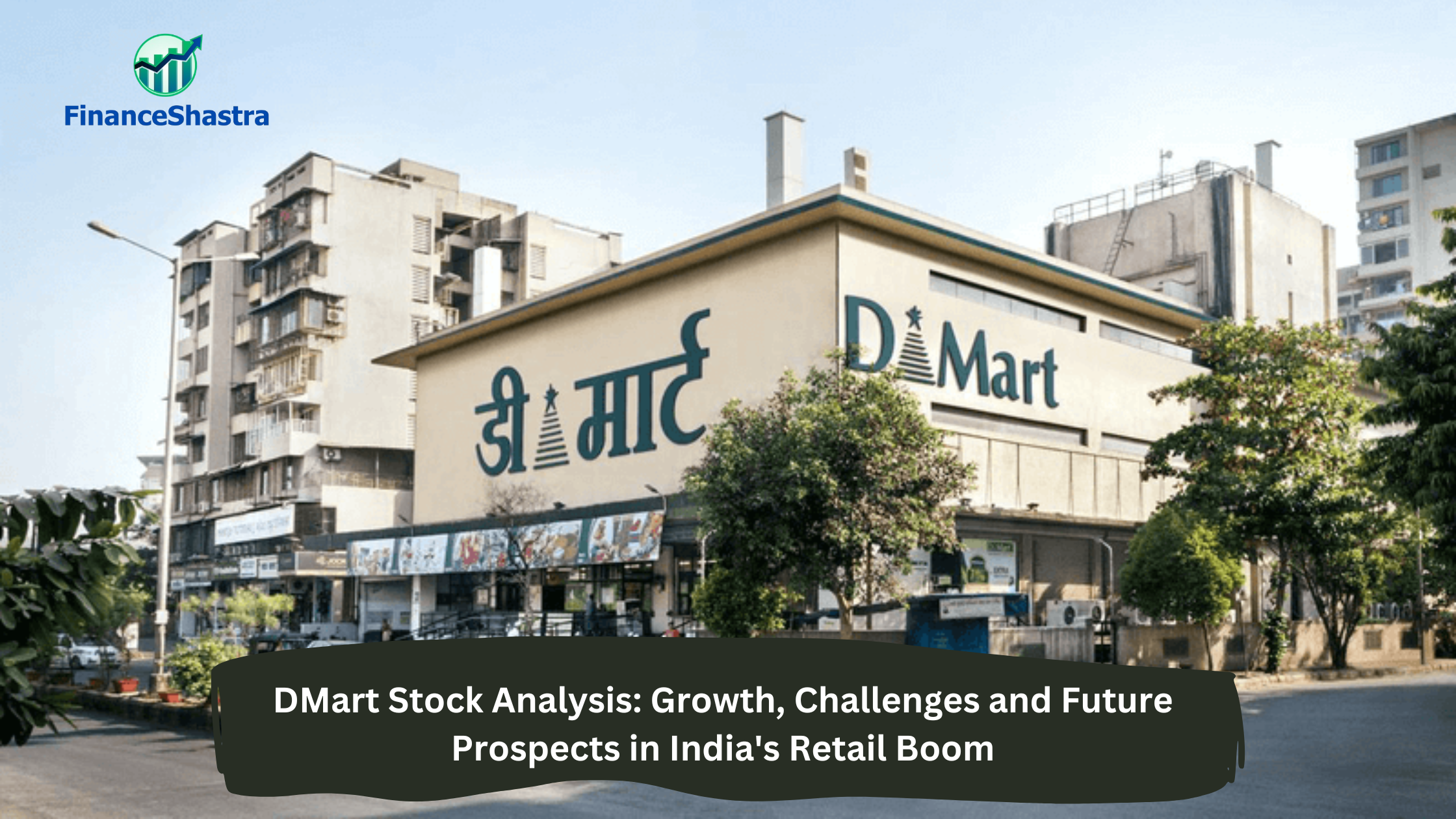DMart Stock Analysis: Growth, Challenges and Future Prospects in India’s Retail Boom
Business and Industry Overview:
Avenue Supermarts Ltd., also known as DMart, is a supermarket chain in India. It was started by Radhakishan Damani in 2000. The first DMart store opened in Powai, Mumbai, in 2002. DMart sells many products, like groceries, clothes, home goods, and electronics, all at low prices. At first, DMart grew slowly. By 2010, it had 29 stores in Maharashtra and Gujarat. By 2013, it had 65 stores, including stores in Hyderabad and Bangalore. DMart became popular for having big stores. Most of their stores are 30,000 sq ft or larger. This helped them sell many products in one place. In 2016, DMart started DMart Ready, a service for online grocery shopping. In 2017, DMart became a public company. It listed its shares on the stock market. This allowed people to buy shares in the company. By 2022, DMart had more than 300 stores. The company has stores in many states, like Maharashtra, Gujarat, Andhra Pradesh, and Karnataka. As of 2024, DMart has 381 stores in 12 states across India. The company employs about 14,000 permanent workers and 60,000 temporary workers. DMart is successful because it sells products at low prices and runs large stores efficiently. It is now one of the biggest supermarket chains in India.
India’s retail industry is growing very quickly. It is one of the largest and fastest-growing retail markets in the world. Many companies from other countries are interested in coming to India because of its huge number of customers. The retail sector makes up over 10% of India’s economy and is expected to grow even more in the future. As more people in India are earning money and spending more, they are buying more products. This is increasing the demand for all kinds of products, like groceries, clothes, and electronics. At the same time, new shopping malls are being built. Around 60 new shopping malls are expected to open from 2023 to 2025, which will add 23.25 million sq. ft of shopping space across India. There are also new ways of buying products. For example, banks and financial companies are helping people buy expensive products by offering easy credit. This means people can pay in installments over time. E-commerce (online shopping) has also become very popular. In 2023, e-commerce companies raised US$ 2.44 billion to help them grow their business. India is a good place for foreign companies to invest. The country has a lot of resources, cheap labor, and many business opportunities. Big companies like Subway are planning to expand their businesses in India. Subway aims to double the number of its stores in India, from 850 to 1,700 in the next 5 to 6 years. The Indian government is also making it easier for foreign companies to set up businesses in India. They have rules that allow 100% foreign investment in certain types of businesses. These changes will make it easier for foreign companies to do business in India and will help create jobs. The retail industry in India employs around 35 million people and is expected to create 25 million new jobs by 2030. This shows that the retail sector in India is not only growing but also helping many people find jobs. The future looks bright for the retail industry in India. DMart is very popular in India because it keeps things simple and smart. It offers low prices, so many people prefer shopping there. The stores are bigger than most, giving customers more choices. DMart opens stores close to each other, usually within 50 km, which helps it save money on delivery and get products to customers faster. DMart also owns a lot of its stores or makes long-term rental agreements, so it saves on rent. It pays suppliers quickly, usually in 10 days, which helps it get discounts. Instead of hiring many full-time workers, DMart hires contract workers to manage costs. The company is careful with its growth, making sure each store is successful before opening more. DMart also sells a lot of products but keeps only a few options in each category, which helps sell things faster and keep shelves organized. These smart choices help DMart stay efficient, keep costs low, and keep growing.
Latest Stock News:
DMart’s share price has gone up by 6%, reaching ₹3,876.90. This happened because more people were buying the stock. The main reason for the rise is that India’s retail inflation dropped to 3.61%. When inflation is lower, people can spend more on things like food, clothes, and other products. This helps stores like DMart make better profits.
In its latest earnings report, DMart showed that sales grew well, but the profits didn’t grow as expected. This was because the company gave more discounts and faced some problems selling clothes and other general products. These areas are getting more competition, which makes it harder for DMart to make big profits.
DMart’s stock price has gone up by 6% recently, showing that investors are confident in the company. In March 2025, the stock gained 14%, which is a good sign, especially since the overall market has not been doing as well. The company is financially strong because it has no debt. This is important because it means DMart can continue growing without worrying about borrowing money. The recent drop in inflation to 3.61% is also good for DMart. When inflation is lower, people are more likely to buy things they don’t always need, which helps DMart’s sales and profits.
Potentials:
DMart is also going through a change in leadership. A new CEO will start in 2026, which could bring changes to how the company works. Even though the stock price has risen recently, DMart’s shares haven’t done as well as the market in the past six months. So, while it’s doing better now, there are still some challenges ahead.
DMart has big plans for the future. The company wants to keep growing by opening 40-60 new stores every year. In the future, this number could go up to 70 stores a year as it builds better systems. The new stores will be in clusters, meaning several stores will be built close to each other in the same area. This will help DMart become stronger in places where it already has stores, while also slowly moving into new areas.
Besides opening more stores, DMart is also focusing on its online platform, DMart Ready. The company plans to grow this service in big cities first, instead of expanding to too many places at once. DMart wants to make sure deliveries are faster, aiming to get products to customers in under 12 hours in city areas. Although home delivery is a big part of growth, DMart is working on improving its online shopping experience and making it profitable.
Investors should focus on DMart’s business performance, how it is run, and whether the stock is reasonably priced before deciding to invest in the company.
Analyst Insights:
- Market capitalisation: ₹ 2,48,830 Cr.
- Current Price: ₹ 3,824
- 52-Week High/Low: ₹ 5,485 / 3,337
- Stock P/E: 91.5
- Dividend Yield: 0.00 %
- Return on Capital Employed (ROCE): 19.4 %
- Return on Equity: 14.5 %
Although DMart faces competition from both big companies like Reliance and smaller online platforms like Zepto, it has a solid plan to keep growing. The company continues to open new stores and improve its products. Also, with a new CEO starting soon, there may be new ideas that can help DMart move forward. Even though it faces challenges in the short term, like giving more discounts and managing bigger stores, its strong financial position and growth plans make it a good long-term investment. For now, it’s a safe bet for long-term investors, but those looking for quick gains might want to be cautious because of the ongoing competition.


